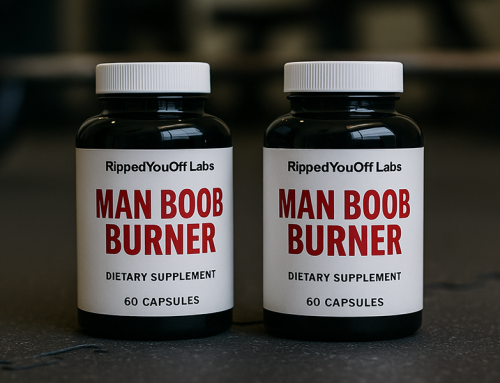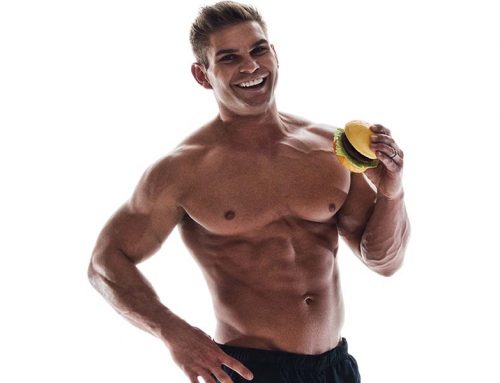Recent nutrition and supplement research has revealed countless discoveries that could dramatically improve your muscle-building results. Science has also uncovered new information disproving things that were once held as gospel in the bodybuilding world. In this exclusive interview, you will learn the latest news on fish oil versus flax oil for essential fats, what the science says about the new creatine formulas, keen insights into supplement research methods, the truth about optimal water intake and fat loss, the dairy product controversy and much more. Apply what you learn in this exclusive interview with Will Brink and I guarantee you will improve your muscle-building results while saving time and money on methods and products that just don’t work. Then, watch for part 2 coming soon!
NOTE: Will Brink is the creator of the popular Bodybuilding Revealed system, one of the most comprehensive science-based muscle building programs available on the Internet. Will has been a contributing writer for Muscle Mag International for as long as I can remember and I’ve been reading those columns, it seems, since the “good old days” of bodybuilding. Will has been doing this a long time and he is a wealth of knowledge, especially on matters of bodybuilding nutrition and supplements. It’s a privilege to be granted this exclusive 2-part interview because Will is a busy guy who doesn’t give a lot of interviews.
Tom Venuto: Will, I’ve been following your work for ages and consider you an expert in all areas of bodybuilding, nutrition, and training. Your knowledge base is very broad. You’re also a stickler for science and a no-BS straight shooter on all these subjects, which is why I’m here and I’m pleased to share this info with my readers. In my opinion, your knowledge of supplements in particular is one of your strongest points, so I hope you don’t mind if we start with that subject.
First question: Amidst all the garbage supplements on the market, one that has been proven effective is Creatine Monohydrate. I’ve noticed that not only are supplement companies pushing their new versions of creatine like Creatine Ethyl Ester, but also combining creatine with other ingredients like beta alanine and glutamine. What are your thoughts on combining creatine with other ingredients? Any new research on this subject we should know about?
Will Brink: That’s more difficult to answer than it might seem on the surface. The problem is, companies mix all sorts of stuff, sometimes based on some study, but usually for marketing purposes. Many times what they are mixing into a formula with creatine makes no sense at all. So, it’s really formula by formula to see if what’s being mixed has any merits. The missing link in that equation is dose: not only does what’s mixed need to make some sense, it needs to be in a dose that has actually been shown to have the effects we want. It’s not at all uncommon for a company to do the former (mix creatine with something beneficial) but fail to do the latter, which is use a high enough dose to have any effects. It’s what I call “label decoration” where the company lists dozens of ingredients on the label, none of them in doses worth a damn, which is a very common strategy I am sorry to say. In both my Fat Loss Revealed and Bodybuilding Revealed (FLR and BBR respectively) programs our goal is to teach people to recognize the differences and thus save money in the long run.
Tom Venuto: Why is that sometimes one or two studies look promising, but researchers don’t follow up with more research to replicate and confirm the findings? I wouldn’t recommend a supplement on only one study, would you?
Will Brink: Generally no, I would not recommend a product on a single study, but there are exceptions. If say a product contains 5 ingredients and each of the 5 has 10 solid studies behind it, the product uses the doses of each that where found in those studies to be effective, and the product itself has one study, I may be perfectly happy to recommend it, even though the product in question has one study. However, if it was a new ingredient; call it compound X, and compound X has only one study supporting its use, I would probably not recommend it. It also comes down to the quality of the study. One well done study published in a respected journal is still better then 10 poorly conducted study published in some minor journal coming from a country we know has very poor standards of research. So, it’s not really a black and white issue there. This is why there is so much confusion out there, most people don’t know the finer points of science or what can be subtle differences and other issues that marketers use to confuse people. The ad might say “study shows 90% increase in muscle in 90 days” but the study was done on a single rat in Cambodia by a “researcher” who sells the product and was published in a journal owned by his brother…
Why don’t they follow up on a study to replicate the findings? That’s a tough question to answer. I agree, it’s curious. You get a study that shows supplement X has benefits and it seems like a no brainer to follow up with additional studies to confirm it. Studies are expensive, but for every dollar spent, 10 comes back, if the study is used as a marketing platform correctly and it’s a decent study. Every company I do consulting work for I always push the benefits of funding real research, vs. the garbage that often passes for research found on many web sites, etc. This is a topic I can rant about all day, so I will stop here. Let’s just say, the general answer to your question comes down to the usual suspects: greed, ignorance, short sightedness, lack of money, lack of interest, etc.
Tom Venuto: What about prohormones? I have to admit that I never did fully understand the chemistry behind pro-hormones and never did much research in that area. Do we classify them as supplements? Drugs? Some gray area in between? What are pro-hormones exactly? If I took them, would I still be “natural?”
Will Brink: of course most of the pro hormones, such as Androstenedione and others that followed were banned, so it’s somewhat of a moot issue. Although not technically interchangeable terms as far as science is concerned, one can think of the pro hormones such as Androstenedione as precursors to more powerful hormones, namely testosterone. Androstenedione, a precursor or ‘pro hormone’ converts via enzymes to the more anabolic hormone testosterone. That’s the super simple explanation, but it’s more complex of course. Various pro hormones followed the original “andro” supplement, some of which were more effective than the original, and were then banned. As always, banning one thing only lead to something stronger and (potentially) more dangerous. I refer to what’s often called “designer supplements” such as the original Superdrol and others. These “supplements” are modified versions of existing steroids/hormonal analogs, and we don’t know their pharmacology in terms of efficacy, side effects, etc.
A certain amount can be figured out from the chemistry (e.g., its potential to convert to estradiol, etc.) but make no mistake, small changes in hormones and hormone analogs can have profound changes on their pharmacology that are not discovered from a simple look at their molecular structure. Make no doubt about this, these newer compounds are NOT pro hormones but true designer steroids of unknown pharmacology. For that reason alone, I recommend people avoid them. You are not using any sort of normal pro hormone, but a true designer steroid here with all the known-and more important-unknown effects – good and bad. How can this possibly be legal you ask? Due to loop holes and poor language in the current law, it’s not legal per se, but it’s not exactly illegal either, and as expected, banning the true prohormones only led to more effective and potentially more dangerous gray market “supplements.” In some respects this too is a moot issue as these products were banned also for the most part, but all manner of steroidal compounds find their way into the market, mostly via the ‘net, so it’s a crap shoot out there.
Hard to really comment on the “natural” issue as it’s really a distinction science can’t make. It’s not “natural” to fly, but it sure beats walking! Most tested sports events have banned such products, so people need to see the list of banned substances if they compete in tested events. As mentioned, I simply recommend people avoid these products and they get a big thumbs down in my BBR ebook.
Tom Venuto: Ok Will, here’s the big debate over the last few years. Most experts are saying fish oil over flax oil these days. First, are you still as bullish on flax as you were 6, 7, 8 years ago? Any thoughts on using both – either at the same time, or alternating?
Will Brink Big questions! There’s a lot in that one that could take up a lot of space! As you may recall, I was the guy who introduced flax oil to the bodybuilding/fitness industry by writing the first articles on the use of flax for fat loss in the magazines “back in the day” as they say. Actually, I have recently altered my diet recs to be more fish oil oriented and less flax oil oriented. To back up a bit, one major reason I was so bullish on flax vs. fish oils was the fact the quality of fish oils at the time was very poor. Tests found it was common for fish oil supps to be rancid, and contain toxins such as PCBs, mercury, and other toxic compounds. However, the quality of fish oil supplements across the spectrum of products has improved greatly in the past few years with the use of processing techniques such molecular distillation and others, which produces very high quality fish oil products standardized for their “active” lipid content. So, I no longer have the above concerns and reservations for fish oil supplements, which is a good thing, considering how useful and healthy these products are. Thus, my diets in FLR for example now favor more fish oil and less flax.
Personally, I still use both, but my own diet is also higher in EPA/DHA from fish oils and lower in flax than it was a few years ago. Flax is still a great healthy source of fat calories, and can still be part of the diet, but does not need to be the sole source of Omega-3 fatty acids in the diet. No real reason to alternate them. I keep my fish oil intake steady but will rotate my other oils, such as flax and more balanced oil sources such as Udo’s Choice and others such as hemp. There’s no hard and fast rule to that per se. People should shoot for approximately 30% of total calories coming from fat, of which a third to a half should come from healthy fat sources such as fish, flax, hemp, etc.
Tom Venuto: Another nutrition controversy that has heated up lately in both the fat loss and health fields is over dairy products. We have some alternative health gurus on the net spreading the message that they believe dairy products are unhealthy and have no place in the human diet; and not just referring to the lactose intolerant, but to everyone. On the other hand, I just read a peer-reviewed paper that said the opposite: that milk has more bioactive compounds than we previously thought and that fermented dairy products have their own functional health improving properties. What are your thoughts on the milk and dairy debate in both health and body fat loss contexts?
Will Brink: I think the anti milk crowd supply very little quality objective data to support their position and rely more on objective non science reasoning. They make claims they either cant back up or attempt to back up with less then quality “research.” Dairy products have a place in a healthy well balanced nutritional plan, and like most things in life, there’s potential for too much of a good thing. It’s a non-issue in my book.
Tom Venuto: The big pastime of the last several years is debunking stuff that was accepted as the standard advice for decades. People love myth busting. Here’s one that caught my attention. A couple of nephrologists took to task the 8 glasses of water a day advice and said they couldn’t find any evidence for that recommendation and said we don’t need as much water as we thought. Funny enough, I saw TWO studies published right after that one; one showed a correlation between higher water intake and weight loss and another showed increased thermogenesis. So now that we are thoroughly confused, how much should we really drink? Are we wasting tons of money on bottled water, not to mention all the trips to the bathroom?
Will Brink: Much of this probably comes down to the issue of adequate vs. optimal. Can people survive on less than the old maxim of 8 glasses per day? Sure. Thus “need” which is equal to adequate is very different then optimal. As with many old recommendations, 8 glasses or less might be perfectly adequate for some, while not sufficient for others, depending on body mass, activity levels, temp, and other factors. Anecdotally speaking, it’s a very common theme that people report better weight loss, performance, and general well being when they drink plenty of water.
Continued In Part 2
About Will Brink

About Tom
Tom Venuto is a fat loss expert, lifetime natural (steroid-free) bodybuilder, certified personal trainer, freelance writer, and author of the #1 best selling diet e-book, Burn The Fat, Feed The Muscle: Fat-Burning Secrets of The World’s Best Bodybuilders & Fitness Models( e-book) and The Body Fat Solution (Hardcover, Avery/Penguin Books). Tom is also the founder and CEO of the Internet’s premier fat loss support community, the: Burn The Fat Inner Circle.
BRINK’S BODYBUILDING – NEW EXPANDED EDITION
Independent Researcher Known For Brutal Honesty Reviews Popular Bodybuilding Supplements and Reveals How To Build Solid Lean Muscle Without Drugs
Will Brink is an independent bodybuilding and fitness writer/researcher who is a stickler for the facts and the unbiased reporting of research. If you’d like to see an independent expert’s review of popular bodybuilding and muscle-building supplements, and you’d like to learn which one’s really work and which ones are complete hype, and if you are interested in a science-based muscle building nutrition and training system, then I highly recommend Will Brink’s newest program, Brink’s Bodybuilding. Click here to find out more: www.brinksbodybuilding.com








wish will had explained more which creatine combinations to take
kevin, stick with creatine monhydrate. To see will’s full list of “the creatine graveyard” see:http://www.tomvenuto.com/articles/creatine_graveyard.shtml
Another sensible, informative post, Tom. It’s sane postings like this that increase confidence and boost motivation. I look forward to more!My “training age” is almost two – almost ready for my training pants! Thankfully, my training pants are a lot smaller than my jeans ever were, thanks to you and BFFM! If this keeps up, I may have to change my name to “Lean Preacher”!
Flax oil vs fish oil. I liked you answer on the flax oil – fish oil debate. I too think fish oil is better for you then flax oil. I would however like to mention that fresh ground flax seed in your cereal or yogurt etc can be very good for you. It has very high fiber content and this can keep the system running good. It is also high in lignans which has been shown to be anti cancer and a couple of other good healthy effects. So ground flax can certainly be a good addition to any healthy diet but also keep taking the fish oil. Flax does not have the good omega 3 fats (DHA and EPA).Fish Oilcan really help increase your omega 3 levels. Learn the best type of fish oil. Find out what is the best way to increase your omega 3.
check out hemp seed, a much more nutritious, bioavailable choice for EFA’s than flax seed. hemp seeds taste a lot better than ground flax seeds too.
Elaine, thanks for your post. My question to will was regarding fish oil vs flax oil as a source of essential fatty acids, not flax versus hemp, but hemp is certainly worth mentioning. Hemp seed oil does contain essential fatty acids. hemp protein is also available and these can certainly be choices for vegetarians. for non-vegetarians, I would continue to recommend fish oil as first choice for EFAs. Id be interested in seeing the head to head comparison between flax and hemp seed suggesting that hemp seed is “more nutritious” and a “more bioavailable” choice, i fyou have that data handy. thanks again.tom
thanks alot tom, i realy need these insightful articles about bodybuilding.. i have been a bodybuilder for 8yrs and i still find alot of things that i dont know about.. thanks alot
I prefer flax due to it’s other health benefits especially for the health of your colon and digestion.
Just curious, I take Krill oil every morning that claims its 3 times as potent as fish or flax. The term “potent” in this case is very vague. Any thoughts on krill oil? Its advertised for its Omega-3 content.
Jason, re Krill oil see:http://www.tomvenuto.com/asktom/krill_oil_or_fish_oil.shtml